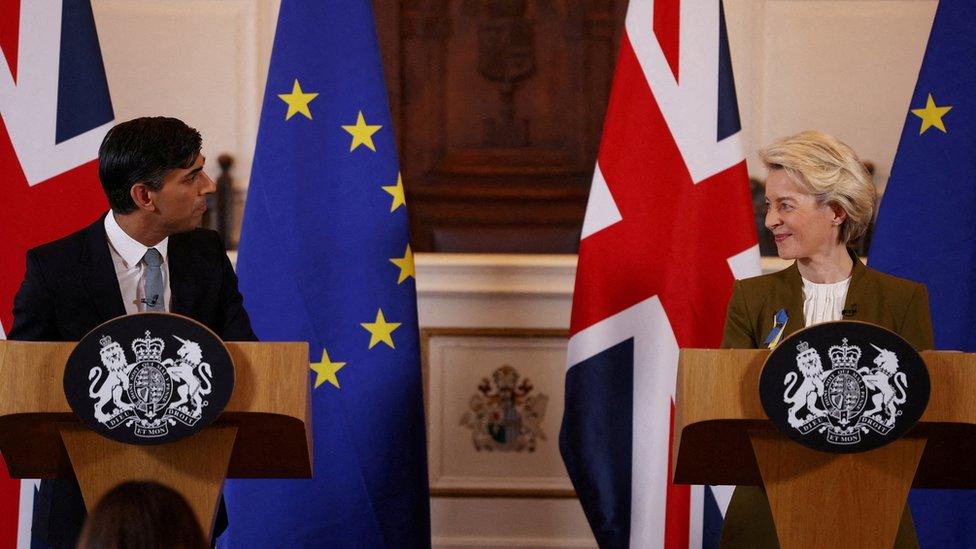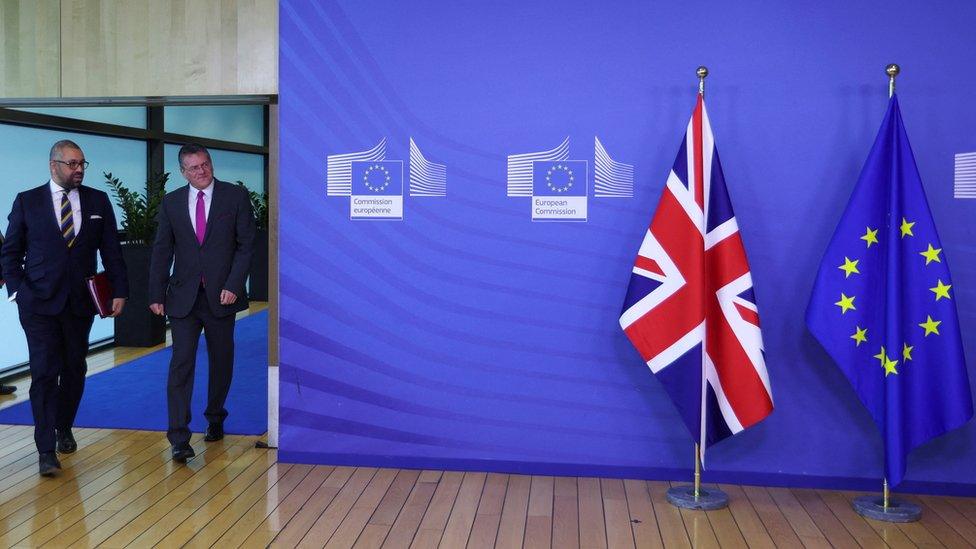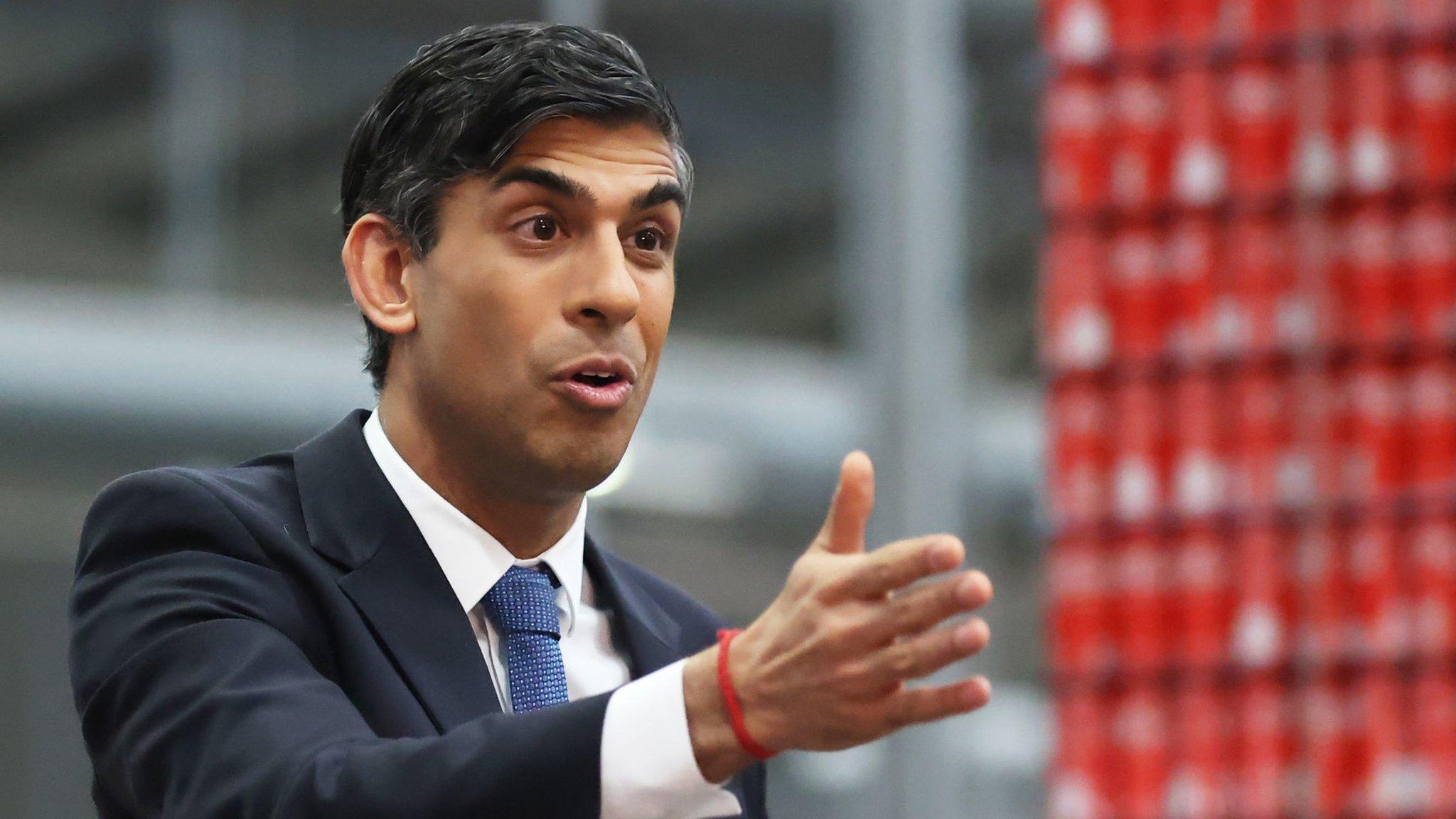Brexit: DUP will vote against Windsor Framework plans
- Published
Sir Jeffrey Donaldson says the Windsor Framework "doesn't work for Northern Ireland"
The Democratic Unionist Party (DUP) will vote against the government's Windsor Framework Brexit plans in Parliament this week.
Its leader Sir Jeffrey Donaldson said he would continue to work with the government on "outstanding issues".
But Downing Street has said there are no plans for substantial change to the deal.
MPs will be given a chance to vote on the so-called "Stormont Brake" aspect of the Windsor Framework on Wednesday.
Sir Jeffrey said the party had made the decision to vote against it during a meeting on Monday.
The framework builds on the Northern Ireland Protocol, which led to disagreements between the UK and European Union (EU) over trade rules.
The Stormont Brake mechanism aims to give the Northern Ireland assembly a greater say on how EU laws apply to NI.
Prime Minister Rishi Sunak said it was proof that the UK has "taken back control" in the agreement he struck with the EU last month.
His spokesperson said it was "the best deal for the people and businesses of Northern Ireland" and that the PM remained "confident it will be backed by the house" .
But Sir Jeffrey said the DUP had "unanimously agreed" to vote against it because of "ongoing concerns".
He told BBC News NI the party would continue to assess the deal, but that "we don't believe that this represents the significant progress that we need to see in order to have the institutions restored at this point".
"There remain for us concerns, for example, and the Stormont Brake deals with the application of EU law in Northern Ireland, but it doesn't address how are we dealing with change to UK law, which could impact on NI's ability to trade within the United Kingdom itself."
He said he wanted to ensure "what the prime minister is claiming is translated into law".
"Our seven tests have not yet been met. Sufficient progress has not yet been made. I am determined to continue engaging with the government and to get this right," he added.
But Sinn Féin's Deirdre Hargey said the deal had already been done and called on the DUP to return to Stormont.
"If the DUP have concerns they have a right to raise them, but that shouldn't get in the way of the formation of an executive," she said.

The Windsor Framework was announced by Rishi Sunak and European Commission President Ursula von der Leyen last month
Sir Jeffrey said the party was committed to the restoration of the political institutions "under the right circumstances".
"We're looking to the government to ensure that there is further legislation that will protect Northern Ireland's place within the United Kingdom and its internal market," he added.
The DUP has blocked the functioning of the power-sharing government at Stormont for more than a year in protest at the Northern Ireland Protocol.
The protocol led to new checks being carried out on goods at Northern Ireland ports in order to maintain an open land border between Northern Ireland and the Republic of Ireland, which is in the EU.
A majority of members of the Northern Ireland Assembly elected in May 2022 were in favour of the protocol, in some form, remaining.
Sinn Féin, Alliance and the SDLP have said improvements are needed to ease its implementation.
Unionist politicians want it replaced with new arrangements.
Applying the brake
The Windsor Framework was signed to alter the Northern Ireland Protocol - and aims to significantly reduce the number of checks on any goods arriving in Northern Ireland from Great Britain.
The Stormont Brake mechanism would also allow the Northern Ireland Assembly to object to new EU rules.
Thirty assembly members, from two or more parties, can pause new EU legislation applying in NI.
This could happen in instances were a new EU law would have a "significant impact specific to everyday life".
Once triggered by the 30 assembly members the new rule would be suspended from applying.
This begins a process of negotiation with London and, ultimately, with Brussels.
At that point the government can veto the rule at the UK-EU Withdrawal Agreement Joint Committee and have it permanently disapplied.
That veto power must be used unless there is cross-community support for the rule, if it would apply to a new regulatory border between Great Britain and the Northern Ireland, or in "other exceptional circumstances", although it is not known what constitutes an exceptional circumstance.
The government said the brake can only be used by a fully-functioning devolved government at Stormont.

James Cleverly and Maros Sefcovic, pictured here in Brussels in February, will meet later this week
Meanwhile, the EU-UK body which oversees the NI Brexit deal is due to meet on Friday to formally ratify the legal changes brought about by the Windsor Framework.
The Joint Committee is co-chaired by UK Foreign Secretary James Cleverly and European Commission Vice President Maros Sefcovic.
The committee is important because it is empowered to amend the Withdrawal Agreement, which contains the NI Protocol in its original form.
The body last met in February last year.
Ministers from EU member states are also due to discuss the Windsor Framework in Brussels on Tuesday.
It is on the agenda of the General Affairs Council, the monthly meeting of foreign ministers or ministers responsible for European affairs.
They will approve the changes to the NI protocol brought about by the framework, ahead of the Joint Committee meeting.
- Published11 March 2023

- Published28 February 2023

- Published2 February 2024
